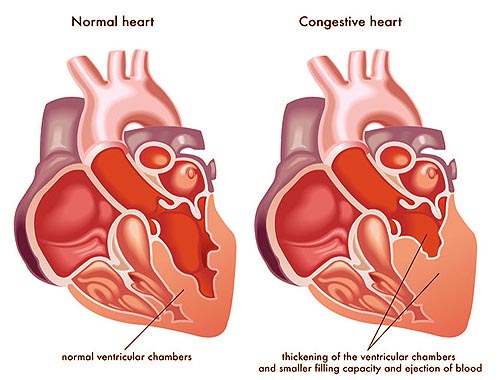Congestive Heart Failure
Congestive heart failure (CHF) is a condition in which the heart function as a pump is inadequate to deliver oxygen rich blood to the body. Congestive heart failure can be caused by: diseases that weaken the heart muscle; diseases that cause stiffening of the heart muscles; diseases that increase oxygen demand by the body tissue beyond the capability of the heart to deliver adequate oxygen-rich blood; A complex clinical syndrome that can result from any structural or functional cardiac disorder that impairs the ability of the ventricle to fill with or eject blood. It is a major and growing public health problem. It is the only cardiovascular disease that is increasing in incidence and prevalence, partly because the population is aging, but also because of improved cardiovascular interventions for disease processes that reduce early mortality but may result in cardiac changes that lead to heart failure. The key manifestations are dyspnea and fatigue, which may limit exercise tolerance, and fluid retention, which may lead to pulmonary congestion and peripheral edema. Diagnosis is largely clinical; a thorough history and physical examination should be obtained to identify cardiac and noncardiac disorders or behaviors that might cause CHF or accelerate progression. The single most useful diagnostic test in the evaluation of patients is the comprehensive 2-dimensional echocardiogram coupled with Doppler flow studies. Measurement of B-type natriuretic peptide (BNP) can be useful in the evaluation of patients at initial presentation. Interventions that have a proven beneficial impact on patient survival include angiotensin-converting enzyme inhibitors, angiotensin receptor blockers, beta-blockers, aldosterone antagonists, hydralazine and nitrate, cardiac resynchronization therapy, and implantable cardioverter-defibrillators.
